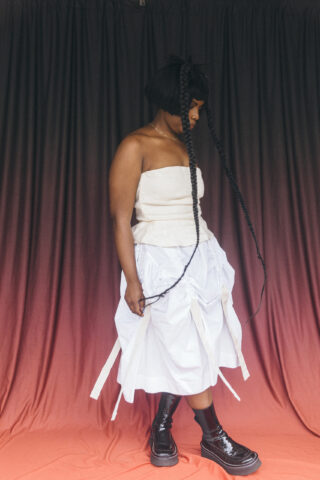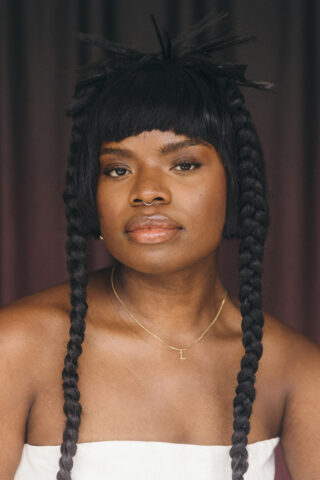Vagabon: “I’m not so critical of myself anymore, because there’s simply no time to be”
The best thing Lætitia Tamko ever did was fly to rural Germany to grieve in solitude and let the ideas come to her

The best thing Lætitia Tamko ever did was fly to rural Germany to grieve in solitude and let the ideas come to her
Lætitia Tamko isn’t sure where to call home right now. “I’m a bit all over the place,” the artist better known as Vagabon chuckles over Zoom. For the time being at least, she’s in L.A. – a temporary base that she’s been alternating with brief spells in New York.
With European dates opening for Arlo Parks and Weyes Blood set for September and November, plus a US headline tour in support of her new LP booked for October, Tamko won’t be laying down any permanent roots in the near future. Not that she’s especially phased by feelings of disorientation anymore. After all, when her family relocated from Cameroon to the US in the mid-00s, Tamko spoke almost no English, and within a few years she was studying computer programming and performing original music in her second language.
Call it a survival technique, call it a personality trait, but there’s always been an underlying stoicism to Tamko. A keen collaborator and a veteran of Brooklyn’s DIY indie scene alongside songwriters like Mitski and Frankie Cosmos, she’s always been intensely sociable. And yet, when faced with emotional turmoil, she maintains that she’d rather seek solace in solitude than in community. It’s a preference that was truly put to the test following the sudden death of her close friend, the musician Eric Littmann, in June 2021.
“It felt like all eyes were on me,” she says, shifting uncomfortably in her seat as she recalls loved ones rallying around her. “They were trying to console me but what I really needed in that moment was time to process. I needed to be somewhere I felt really isolated; because it was all so unbearable I almost wanted to run away from it.”
Tamko found breathing room some 3500 miles away, subletting a friend’s house in a remote lakeside village in north Germany. Freed from her daily routine, phone signal and the obligation to interact socially, she dedicated her time to simple tasks like walking in the forest or preparing meals. And to her surprise, having headspace allowed “ideas to pour in.”
“Without the distractions, I found the thing I wanted to do most was play piano or make something on my computer or write,” she says. “Before I knew it, I had a collection of songs coming together that would eventually become Sorry I Haven’t Called.”
Though dedicated to Littmann, Tamko’s third album as Vagabon isn’t the heavy exploration of grief you might expect; rather, it’s a reaction to it. Building on the bold production choices of 2019’s self-titled effort, Sorry I Haven’t Called pairs vivacious, pop-focused melodies with a newfound lyrical directness that mirrors the open, instinctive approach Tamko is now taking to life. In essence, it’s an album about being emotionally present in every experience, good or bad, because what else do any of us have but now?
Speaking about this shift in priorities, she explains: “Grief feels like this secret club that no one really wants to be a part of. There’s so much disquiet, and one of the main things that I found was that I didn’t even remotely care about the stuff I used to care about. It made me feel like I was a newborn child or something. And I’m really proud of translating that feeling on this record, creating something that is playful but also complex.”
Lead single ‘Carpenter’ is emblematic of this approach. Created with Rostam Batmanglij (Carly Rae Jepsen, HAIM) it pairs a gambolling melody inspired by South African house music with lyrics addressing personal growth. “I wasn’t ready to pull me out / I wasn’t ready to move on out,” she coos in the chorus, before calmly asserting, “But I’m all ready now.”
“I was still parsing out this introspection, unsure of how to talk about what I was feeling without going too deep,” Tamko says of the song’s genesis. On ‘Can I Talk My Shit?’, it feels like she’s figured out the balance. Propelled by a puckish joy, it finds Tamko chiding, “I’m way too high for this,” over a dubby bass groove, before building layers of feather-light harmonies and glittering synth arpeggios.
‘Made Out With Your Best Friend’ is even more flirtatious, its skittering beats and chopped vocal samples building momentum for the mischievous kiss-off, “And he loved it”. As Tamko explains with a grin, the album’s title is intended in a similarly unapologetic tone: “It’s more like, sorry I haven’t called but I’ve been busy living my life.”


Sonically, Tamko’s life-long love of dance music provided the main inspiration for the album. It’s an interest she first explored professionally via the bedroom house of 2019 single ‘Water Me Down’. But following Littmann’s untimely passing, the sanctity of the dancefloor suddenly took on a whole new significance: “Just dancing in the dark was an incredibly huge source of joy for me in my grief and I wanted to replicate that experience.”
Returning from Germany with an album’s worth of demos, Tamko sought out collaborators who could facilitate her vision, including Rostam, Casey MQ (Oklou, Eartheater) and Teo Halm (Rosalía, SZA). When asked to define her role in the process today, she settles on ‘Executive Producer’, with the caveat she’s a little uncomfortable with the term.
“I made my thesis and I figured out who I wanted to be on this album based on what I know they do well,” she reasons, slipping back into science kid parlance. “Being from an engineering background of math and hardware, I like tangible things. Feelings aren’t tangible, but production and instruments are. So it was like, ‘Casey’s really good at these beautiful inversions of chords,’ or, ‘Rostam is really good at like blending analogue and electronic elements.’”
That’s not to say Tamko has entirely abandoned the unvarnished honesty of her 2017 debut Infinite Worlds. ‘Autobahn’ evokes the intimacy of Immunity-era Clairo, its muted keys tightly hugging the vocal melody. Likewise, the melancholic indie-rock of ‘Anti-Fuck’ is relatively frill-free, bar some artfully squalling guitar distortion. Both songs tackle the collapse of a romantic relationship she formed while in Germany, though the latter features the ambiguous refrain, “Forget enough to love what you remember.”
Throughout, she can trace her growth as a lyricist. “I think I’ve always been thinking about the poetry of words in a more formal, ‘Ok, let’s sit down and write’ way… But with Sorry I Haven’t Called I’ve found the poetry in conversation; the romance and the humour that there is in those daily interactions. Also, even when I’m talking about something difficult, I can still come to it in this assured state of abundance. You know, that it isn’t the end of the world, and it really never was.”
This sense of perspective is the main gift that she has taken from the painful experiences of the past few years, ultimately facilitating a level of self-awareness that has proven transformative. “I’ve really changed a lot through bereavement and grief counselling,” she nods. “I’m not so critical of myself anymore, because there’s simply no time to be. You know, none of us have time.”
For a spell after Littmann’s death, Tamko thought she might have lost her sense of ambition. “I almost went, none of this matters,” she recalls. “Like, who cares if I make an album? But I realised that my goals had just changed. For me, connection and friendship and community and love are the only important things in life. But they can exist within my work too: I no longer have to choose one or the other.”